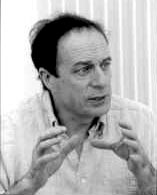
|
|
|
|||
|
'That
weasel word' By Omayma Abdel-Latif
As an increasing number of intellectuals speak
out against the
Tom Paulin does not attempt to hide his anger at what the Israelis are doing in Palestine: it is, he says, "an historical obscenity." Paulin, currently professor of English at Hartford College, Oxford, a leading poet and, for several years now, a controversial TV pundit, is among the few British intellectuals who has dared to criticise Israel, questioning even its very existence. "I never believed that Israel had the right to exist at all," Paulin told Al-Ahram Weekly . "Paulin has become the rare thing in contemporary British culture; 'the writer as conscience'," wrote one critic. It is a position that has led him into acrimonious public debates about his political views, particularly in relation to the Arab-Israeli conflict. He recently took up his pen in defence of Edward Said, berating Guardian columnist Ian Buruma as a Zionist. Paulin makes no secret of his uncompromising views on Israel. "You are either a Zionist or an anti-Zionist," he says. "Everyone who supports Israel is a Zionist." Such Irish bluntness, as one reporter described it, has made him a constant target. His publication of the poem "Killed in the Crossfire" in the Observer newspaper almost a year ago caused an uproar within pro-Israel circles with predictable consequences: the usual accusations of anti-Semitism followed almost immediately.
Paulin is not intimidated by such tactics. "I just laugh when they do that to me. It does not worry me at all. These are the Hampstead liberal Zionists," he explains, "I have utter contempt for them. They use this card of anti- Semitism. They fill newspapers with hate letters. They are useless people." Although he describes himself as a failed historian, Paulin maintains a habit of explaining politics only in reference to history. "In my view the European culture carries a very heavy responsibility for the creation of Israel... it is a product of both British and Stalin's anti- Semitism, but the British never faced their own complicity in its construction." Should the British, then, declare a historic responsibility towards the plight of the Palestinians? "I am not very moved by historical apologies. I don't think the British carry a historical consciousness either." But why? "Because there is a sort of amorphous, sort of darkness at the heart of things, because there is a certain kind of complacency and individualism." Despite this bleak vision, Paulin thinks the majority of British people do support the Palestinians. The problem is, though, that there is no way of articulating this support. "This sympathy is not translated into force against the British government because it is not like the anti- apartheid movement which had a high profile here and Mandela is a more engaging figure than Yasser Arafat," he says. But he believes that the Palestinian cause must somehow occupy that space. "I think protest and actions have to be organised against the Israelis and their backers. There needs to be a concerted high profile campaign to raise awareness of the people in this country." One of the responsibilities of the writer is to take a stand, argues Paulin, and any literary-political weapon he can summon to support his cause he will. Recently he resigned from the Labour party after realising that the Blair government was "a Zionist government." "Sixty members of the Labour party went on friendly visits to Israel. Blair's special envoy to the Middle East, Lord Levy, has a son who works for the Israeli government, which means that it is linked in all kinds of ways to the Zionist government in Israel." Israel Paulin describes as an "ahistoric state." "It is a state created by the powerful nations somewhere else. It is an artificial state." Nor is he quiet about the balance of power between the Israelis and the Palestinians. The Palestinians, he says, need good anti-tank weapons. "They have got to meet force with force. They have to be cunning and forceful." So how does the suicide bomber fit within this balance of power? "I can understand how suicide bombers feel," he answers. "It is an expression of deep injustice and tragedy. I think -- though -- that it is better to resort to conventional guerrilla warfare. I think attacks on civilians in fact boost morale. Hitler bombed London into submission but in fact it created a sense of national solidarity." If there is one thing Paulin clearly abhors about Israel, it is the Brooklyn--born Jewish settlers. "They should be shot dead," he says forcefully. "I think they are Nazis, racists, I feel nothing but hatred for them."
|
|||

